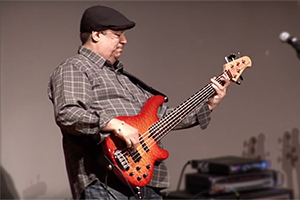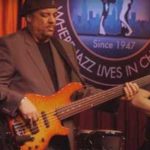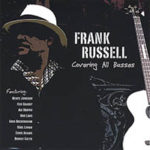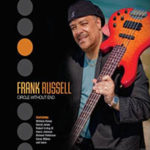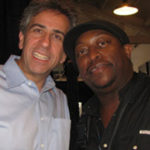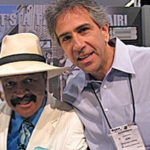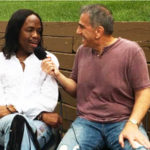Exclusive interview with FBPO’s Jon Liebman
September 2, 2019
Chicago native Frank Russell began playing bass at the age of 14. Influenced by bass greats Larry Graham, Verdine White, and Stanley Clarke, among others, Frank fell in love with the bass and was determined to have a career in music. Throughout the course of his career, Frank has performed with Freddie Hubbard, Ramsey Lewis, Alphonse Mouzon, Wallace Roney, Robert Irving III, Henry Johnson, and many others, including a 6-year stint with South African vocal group Ladysmith Black Mambazo. He is also is a past recipient of the Hennessy Best of Chicago Jazz Search. As a leader, Frank’s solo releases include 2005’s Covering All Basses, and 2011’s Circle Without End. His most recent project, Influences (A Tribute to Bass Guitar in Jazz), released in 2018, features Miles Davis alumni bassists Darryl Jones and Richard Patterson. Currently, Frank is excitedly preparing, once again, to assume the bass duties for Ladysmith Black Mambazo at Chicago’s Steppenwolf Theatre, beginning in the fall of 2019.
FBPO: Congratulations on getting the Ladysmith Black Mambazo gig. It’s been a while since you played that show.
Frank: Oh my God! Twenty-three years. We opened at the Steppenwolf Theatre twenty-three years ago. It broke box office attendance records, then it traveled to the Kennedy Center, New Jersey, Boston…
FBPO: Is there anyone you’re going to be working with now that was with the show the last time you played it?
Frank: Nobody from the play is back, except some guys from the Ladysmith group, the guys that sang with Paul Simon on Graceland. Four sons of Joseph Shabalala are in the show, and also two cousins. Other than them, I’m the only person from the original play.
FBPO: Tell me about the show.
Frank: It’s about a South African girl. Her name is Lindiwe. The story basically deals with this South African woman who comes to Chicago. She goes into a blues club, and meets a drummer, who happens to be white. I’m the leader of the blues band!
FBPO: What about the music? Is it similar in style to what it was on Paul Simon’s Graceland album?
Frank: Well, kinda, yeah. It’s South African music, and there’s blues music.
FBPO: What’s the instrumentation?
Frank: It’s just bass, guitar, and drums, so far. I’m trying to get a concertina in there. Most of the time, though, it’s just guitar and bass.
FBPO: You play so many basses and styles, 4-string, 5-string, fretless… How do you define yourself as a bass player?
Frank: Nobody’s asked me that. I wanted to play all genres. I love all types of music. I wasn’t one of those jazz snobs. I kind of patterned myself after Herbie (Hancock). You know, Herbie got a lot of flack for going into electric music and stuff. But I listened to upright bass players from my dad all my life. Then the Motown thing came in, and James Jamerson, and I gravitated toward that when I first got a bass, at 14. Then I was listening to Larry Graham, and Verdine White. And then Stanley came on and blew my mind. And then Jaco and, you know, Anthony Jackson, and Victor Bailey, and all the rest. I would call myself just a bass player who plays anything he can get his hands on.
FBPO: I read somewhere recently that you tune your 5-strings with a high C, instead of a low B.
Frank: Well, I do both. When I’m playing melodic, upper register stuff, I got a bass for that. Most of the time, I’m playing B-E-A-D-G. So I’ve got basses for both.
FBPO: Instead of two 5-strings, why not just play a 6-string?
Frank: I know! I just never wanted to do that, man, because we just start turning into guitar players, and I wanted to just keep it without going overboard.
FBPO: Well, you’re not going any higher on a 5-string with a high C than you are on a 6-string with a high C.
Frank: That’s true! That’s true. I don’t know. I just never wanted to play 6 strings! Let’s put it that way. [Laughs]
FBPO: Let’s talk about your gear. Start with your new Lakland signature bass.
Frank: I just asked (Lakland president and owner) John Pirruccello. I’d been thinking about a signature bass for a long time, and he thought it was a good idea. I’ve been with Lakland for about eleven years now, as a clinician, and an endorser, and I just thought it was time.
How would you describe the bass?
Frank: It’s gonna be like Darryl Jones’ bass. When we went in the studio, I was wondering why Darryl’s bass sounded so good! And better than mine. It was not active. It’s a passive bass. He said he hasn’t played an active bass since the ‘90s, I believe. I don’t know why it’s got a better tone. It just sounds more meaty to me. It cuts through, for some reason. Of course you’ve got to turn your amp up a couple notches because it’s not as powerful, but the sound is so smooth and brilliant. Most of that stuff on my latest record is Darryl Jones’ bass! And that action on Darryl’s bass – he must be strong as a bull, man. I could barely get around the damn thing! [Laughs]
FBPO: What kind of strings are you playing?
Frank: GHS, for many years now.
FBPO: What about amps?
Frank: Oh, I’ve got a Gallien-Krueger, this little, tiny, 5-pound head that pushes 800 watts. You can literally lose the head if you’re not looking around. I’ve been with Gallien-Krueger for about ten years.
FBPO: How about effects?
Frank: I’ve been using the same effects for a long time. I usually don’t use them except for my gigs as a leader. BOSS chorus, digital delay. I got a cool new BOSS volume pedal, and an envelope filter.
FBPO: Let’s talk about technique. Now that For Bass Players Only is becoming known as a preferred place to learn bass online, what advice can you impart to somebody who wants to learn to play bass?
Frank: If you want to start learning bass, you can’t go wrong by listening to the guys from the ‘70s. There’s a whole lot of guys that you can start listening to, from James Jamerson to Larry Graham, Louis Johnson… What I used to do is listen to that stuff all night, back on cassette players, and subliminally let that stuff sink in. It’s almost like an unconscious indoctrination, and you just hear it all the time.
And from that, I’ve actually told people to go to your site. If you’re a beginner to intermediate, it’s easier now than it was when I grew up ‘cause we had to learn this stuff from trial and error. Now you can go online and see a guy, how you can go from this note to that note. [Laughs] So that’s what I would say.
FBPO: What about the future, Frank? What else is coming up? A new record maybe?
Frank: Well, I might do another tribute, and I was thinking, why not do a tribute to the music of Ladysmith Black Mambazo, do some of their iconic tunes and turn them into more of a jazz/fusion thing? How could I do that? How do you do that with an a cappella singing group? I think it would be kind of a big task, but I think I could pull it off, ‘cause they heard my tributes to them, and they actually dug ‘em. I did the vocals and stuff and they said, “Frank, you sound like us!” I’m thinking, how can I incorporate American music, or even blues music, into Zulu music? I was just trying to think, Can I make a hybrid of that? Kind of a World Music that’d be accessible to everybody. That’s what’s been on my mind. I should do it while it’s still hot and fresh, you know what I mean?
FBPO: Absolutely. Let me encourage you to do it. Get it done!
Frank: Git ‘er done! [Laughs]
FBPO: Frank, what would you be if you weren’t a bass player?
Frank: An actor. Or maybe a comedian. Most of my family and friends tell me all the time, they think I’m funnier than I play bass, and I tell them, well, that’s not a compliment! [Laughs]
See Jon’s blog, with key takeaways from this interview, here.
